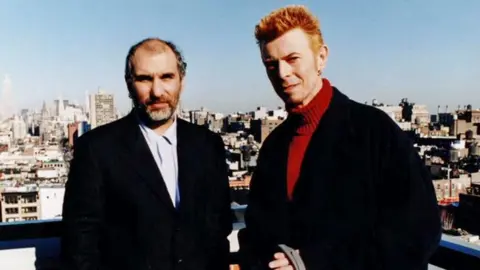Alan Yentob, the esteemed BBC arts broadcaster and documentary filmmaker, has passed away at the age of 78. His death marks the end of an era for British television, as Yentob was a pivotal figure in shaping the way arts and culture are presented on screen. Known for his engaging interviews and insightful documentaries, he left an indelible mark on the industry through programs like “Omnibus,” “Arena,” and “Imagine.”
Over the course of his career, Yentob had an extraordinary ability to connect with some of the most influential cultural personalities of our time. From musicians like David Bowie to writers like Maya Angelou, and artists like Grayson Perry, Yentob profiled an impressive array of talents. His documentaries were not just about showcasing these figures; they explored their complexities, vulnerabilities, and creative processes, providing viewers with a deeper understanding of their art.
Yentob’s contributions to the BBC extended beyond just being a presenter. He held significant positions within the corporation, serving as the controller of BBC One and Two, the creative director, as well as the head of music and arts during his extensive tenure. His leadership not only shaped the programming directly aired on the channels but also influenced the broader cultural landscape of British television.
Philippa Walker, Yentob’s wife, offered a poignant tribute upon his passing, describing him as someone “curious, funny, annoying, late and creative in every cell of his body”. She emphasized his benevolence, calling him “the kindest of men.” This personal glimpse into Yentob’s character highlights the warmth and relatability that those who worked with him experienced.
BBC director-general Tim Davie acknowledged Yentob as a “creative force and cultural visionary,” emphasizing his commitment to originality and risk-taking in the arts. Davie noted that collaborating with Yentob inspired many to think beyond conventional boundaries. He recognized Yentob as a mentor, someone who had a knack for identifying and nurturing talent in television, film, and theater.
Moreover, Yentob’s charisma and connections within the entertainment industry were noteworthy. He forged friendships with celebrated figures, including Jay-Z, Beyoncé, Orson Welles, and Mel Brooks. These relationships not only enriched his documentaries but also provided audiences with a glimpse into the lives of iconic stars. One memorable moment was his portrayal of an arm-wrestling match with Salman Rushdie is a humorous nod to his accessibility and the interactive engagement he fostered with his subjects.
Among his many works, the 1975 “Omnibus” documentary titled “Cracked Actor,” featuring David Bowie during a tumultuous personal period, is particularly revered. This documentary stands out for its intimate look into Bowie’s struggles, capturing both his creative brilliance and personal fragility.
In 1988, Yentob became the controller of BBC Two; his tenure was marked by groundbreaking programming that included classics such as “Absolutely Fabulous” and “Have I Got News for You.” His influence expanded further when he was appointed as the controller of BBC One and subsequently as the corporation’s overall director of programs. In 2024, he was honored with a CBE for his significant contributions to the arts and media.
Despite high-profile controversies in his career, including his resignation following the collapse of the charity Kids Company in 2015, Yentob’s legacy remained impactful. He continued to create compelling content for the BBC, demonstrating a resilience that characterized his approach to both personal and professional challenges.
Alan Yentob is survived by his wife, Philippa Walker, and their two children, leaving behind a legacy that resonates within the fabric of British cultural discourse. His work has not only entertained but has also inspired and provoked thought, furthering the role of arts in public life. As noted by peers and colleagues, the loss of such a unique and passionate figure leaves a significant void in an industry he profoundly influenced.



